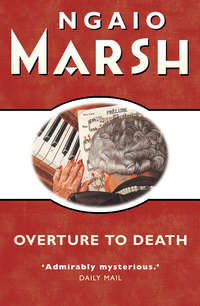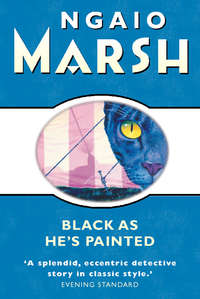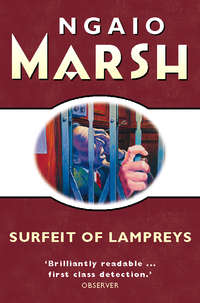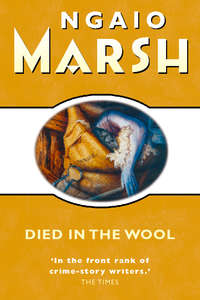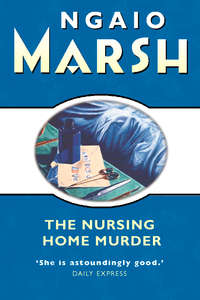
Полная версия
Money in the Morgue: The New Inspector Alleyn Mystery
Wiping his brow and muttering dire imprecations against the weather, the Central Office, the roads and the general state of the nation in wartime, he sat down again, this time in Matron’s own chair. Her desk was covered in papers and he absent-mindedly flicked through them, misplacing the carefully-ordered typed pages of accounts and the hand-written notes.
He shook himself when he realized what he’d done, he’d hate to get in Matron’s bad books and he replaced the sheets carefully one on top of the other, grumbling to himself, ‘If I don’t get away from here at the crack of dawn there’ll be hell to pay, four more rounds to do. Four more and all of them to be paid before Christmas Day with the shops closing up soon enough and turkeys and stuffing and whatnot to cross off the lists. Hell to pay. None of it down to me, not a bit. I told them that old banger had no more in her. If I said it once, I said it a dozen times. I need a new van and hang the expense. Well, now they know the cost.’
Matron checked her watch as she returned to her office. A lovely silver watch, held on an elegant bar, it was given to her by a young man she’d known long ago. He had shyly offered it up just before he left for the last war, the one they had promised would end them all. They had been wrong and the young man had not returned. Not a day passed that she didn’t think of him, and not in a foolish way either, she admitted to herself, standing at the door to her office looking at the dozing irritant that was Mr Glossop, seated in her own chair. With a start, she noticed the papers on her desk had been moved, she crossed to the desk and, making no attempt to keep quiet for the sleeping interloper, she gathered the papers together, settling them once more with a satisfying thump.
‘Well, there we are,’ Glossop woke with a start, pretending he had only closed his eyes for a short while. ‘And how’s it with—you know, the fellow who’s—’
‘Dying?’
‘Yes, yes, that’s the—and the priest chap?’
‘Father O’Sullivan is with him now.’
‘Oh I see,’ Mr Glossop said disapprovingly, ‘All the Catholic doings, smells and bells and that carry on, is it?’
‘Not at all, Father O’Sullivan is an Anglican priest,’ Matron replied, attempting to squash his interest with the look that had her young nurses quaking and, to her chagrin, appeared to further encourage Mr Glossop.
‘Right you are, Matron, I’m sure you’ll tell me when I’m over-stepping bounds. I like a woman who knows her own business.’
Matron decided to ignore him. ‘It’s just gone eight-thirty, Mr Brown’s grandson is coming in on the nine o’clock transport. I hope he makes it in time. You’ll have to excuse me now, Mr Glossop, I’ve work to do.’
Glossop looked at the desk in front of him and realized that the papers he’d been fiddling with had been tidied out of his reach and that he himself was in Matron’s seat.
‘Yes, yes of course. You don’t want a spot of company? Someone to help you go through all those figures? Tricky stuff, numbers, and I’ve a good eye for accuracy, that’s why they gave me the job, of course. You’ve got to have a trusted man on the pay round.’
‘Thank you, but no,’ she cut him off. ‘If you head next door to the Records Office, the young nurse there will take care of you. She knows where the cots are kept and where you’re to sleep and I dare say she’ll be happy to show you to the kitchen. You’ll have to fend for yourself, mind you, our kitchen staff are daily and they left on the last transport back to town. Goodnight, Mr Glossop.’
Knowing himself dismissed, Glossop reluctantly left Matron’s office and went out into the darkening night. And it was still too damn hot by half.
CHAPTER THREE
At nine o’clock Red Cross Transport Driver Sarah Warne swung the Mount Seager bus round Gold’s Corner into the last stretch of the route, known locally as the Long Leg. From Gold’s Corner to the bridge the Long Leg ran straight for fifteen miles across the plains towards the foothills. Before the blackout she used to be able to see the hospital lights for the whole way but since Japan came in the front windows had gone blank. In the aftermath of twilight Sarah could just make out a black mass of buildings against the royal texture of the hills. Behind the hills, the main range, touched on its pinnacles with perpetual snow, awaited the night against a luminous sky. Although the sun was now below the horizon the cusp of Mount Seager was tinctured miraculously with clear rose. The windscreen of the bus framed a vast landscape quite free of human interest, unscarred by human occupation, moving because of its remoteness.
The road was unsealed and from time to time pieces of shingle flew up and banged against the floor of the bus. Sarah knew where the worst pot-holes lay but could not always avoid them. Every time they bumped across a gap or skidded in loose shingle the VADs screamed cheerfully, if a little less loudly than usual because of the young man who sat beside Sarah in the front seat. This was Mr Sydney Brown and they all knew that he was going up to the hospital because his grandfather had been asking for him for weeks and now the old man was nearing the end. Sarah spoke to him once or twice but whatever her observation his replies could be guessed before they were uttered. ‘It is, too,’ ‘I couldn’t say,’ ‘That’s right,’ he said in offended undertones. Sarah thought that perhaps, unlike her, he had not yet seen death at first hand and was sorry for him.
The mountains assumed an incredible depth of blue and the foothills turned more darkly purple. Their margins, folded together in a pattern of firm curves, were faintly haloed with light. The road ran forward into nothingness. The plains on either side of the road and stretching out behind them had taken on a bleached look, seeming to fade rather than to darken as night fell, turning the whole scene into an other-worldly monochrome. Sarah watched the road and her petrol gauge. With one layer of her mind she attended to her job, with another she saw that the landscape was quite beautiful, and with yet another she hunted for things to say to Mr Sydney Brown, or shout to the VADs. Further back, in a hinterland of half-conscious thoughts she wondered if Dr Luke Hughes would come into the Transport Office for his letters that night when she had sorted the mail she carried in addition to her passengers. This last conjecture gradually took precedence in her mind so that when unexpectedly Mr Sydney Brown spoke of his own accord, it was a second or two before she realized that he was joining in conversation with the VADs.
‘Lordly Stride,’ said Sydney Brown.
‘I beg your pardon?’ cried Sarah.
‘Lordly Stride came in and paid a record price,’ said Sydney. ‘I heard it on the air while I was waiting for the bus. Rank outsider.’
An instant babble broke out in the bus.
‘She’s done it! That’s Farquharson’s horse. That’s right, it’s her horse!’ And then the attenuated inevitable coda to most of the VADs’ dialogues: ‘Thass raht.’
‘What are you all talking about?’ Sarah demanded. She was answered immediately by each of her eight passengers. Miss Rosamund Farquharson, the Records Office clerk who usually worked days, had swapped her duty for the overnight shift, and had gone to the races down-country. She had travelled into town on the morning bus and told everybody she was going to back Lordly Stride in the last race. ‘We all said she was mad,’ the VADs explained, but the truth was Rosamund Farquharson was in a mess and needed the money, so much so that what might have felt like a steep gamble to her colleagues had seemed a genuine lifeline when she laid the bet, fingers crossed and whistling hope.
‘You are a lot of gossips,’ Sarah said mildly.
‘It’s not gossip, Transport,’ shouted one of the VADs. ‘She tells everybody about it. She’s not fussy, she doesn’t care who knows. That dress she bought for the races—well, bought! She said herself there was only one shop left where they’d give her credit.’
‘She’s mad,’ said a small nurse profoundly.
‘I’ll say.’
‘Did you hear about her and old Comfort?’ asked a solo voice.
‘Eee—yes!’ the chorus chanted.
‘No. What?’ the nurse demanded.
‘She caught Rosie kissing one of the boys when she brought the mail round.’
‘She’s mad.’
‘Comfort or Rosie?’
‘Both.’
‘I’ll say.’
‘But Roz is being a fool to herself.’
‘No need to ask which of the lads it was.’
Mr Sydney Brown cleared his throat. The voices faltered and were obliterated by the grind of tyres on shingle, body rattles from the bus, and by the not inconsiderable racket of the engine. Sarah began to wonder uneasily on the subject of their discussion. She was surprised to discover in herself a violent distaste for this gossip about Rosamund Farquharson; surprised, because their friendship was a casual affair based on a similarity of experience rather than of taste. They had met properly in the Mount Seager Records Office. Each of them had returned to New Zealand after a long absence in England but while Miss Farquharson perpetually bewailed the lost gaieties of her glorious existence in the London of art school and galleries, Sarah tried very hard to avoid such lamentations. Since the outbreak of war she too had suffered from a painful nostalgia for the old days. Where Rosamund had attended art school, Sarah had three years at Oxford and one at a dramatic school under her belt, in addition to another two years spent struggling to find small pickings in indifferent companies. While Rosamund’s memories were constantly invoked in a rose mist of past bliss, Sarah’s were solid and genuine. After exhausting months in weekly rep, in the farthest flung corners of what her parents’ generation of New Zealanders still referred to as ‘Home’, Sarah eventually fluked her way into a West End production and the most poignant of all her recollections were of London. She was called back to New Zealand for a family crisis when her younger sister became ill. The sister had been expected to recover, but her shocking and sudden death made it impossible for Sarah to leave their widowed mother alone in New Zealand. With a sensation of panic, she had stayed on, and then she was trapped by the war.
‘You’re lucky to have got away. England’s a good country to be out of now,’ the Mount Seager day porter once said, and Sarah had enormously warmed to Rosamund Farquharson when the usually cynical and smart blonde replied fiercely, ‘Do you like to keep clear when your best friends are against it? I should think not. And nor do we.’
A little self-righteously, perhaps, they had formed an alliance. They had few tastes in common. Rosamund had been given two years at the London art school by a generous English aunt. She had, it appeared, been hailed back to New Zealand by her parents upon distracted representations made by this same aunt. Her interests were focused so ruthlessly on young men that she had the air of being a sort of specialist. The leap from small town New Zealand and the humble abode of a school teacher’s family to Bloomsbury studio parties, had reacted upon her like the emotional equivalent of an overdose of thyroid gland. Rosamund had listened first with bewilderment, then with encouragement and finally with the liveliest enthusiasm to monotonous conversations about eroticism, at that time the fashionable topic among art-students. She quickly collected an amazing jargon and a smattering of semi-technical information which, like some precocious reincarnation of the Ancient Mariner, she was quite unable to keep to herself. Rosamund was given to using tediously blasphemous and indecent language, and her favourite recreation was a process she called ‘waking up the old dump’. At first Sarah had a notion that most of Rosamund’s dissipations ruled these purple patches to her telling of them; but with the appearance of Private Maurice Sanders among the recovering men of Military 1 she was obliged to change her opinion.
‘This time,’ Sarah thought with a sigh, ‘I’m afraid she is doing an odd spot of the bonnet-and-windmill business. And with Private Sanders! How she can!’
She switched on her headlamps. About two hundred yards ahead the Long Leg ended abruptly. They had reached the edge of the plains. A great river made its exit from the mountains a mile or two to the west, flowing down from the foothills. With the sheer banks of the riverbed the plains ended as sharply as if they had been sliced away by a gargantuan knife, the foothills rising steeply above and the mountains proper beyond. Sarah changed down. The Long Leg dived into a precipitous cutting and finished emphatically at the deep chasm of the river. The wheels of the bus rattled across the wooden planks of the old bridge. The headlamps found white painted rails and uneven planking, loose boards clattering ominously beneath the weight of the bus. Sarah heard one of the VADs say to another, ‘I hate this part of the trip, the bridge is far too rickety for my liking.’
‘I’ll say,’ her pal replied, ‘and that wooden rail wouldn’t stop a dog from falling in, let alone this bus.’
They giggled nervously as Sarah changed down again and in the split-second while the gears were disengaged the voice of the river could be heard, a vast cold thunder among boulders below the high bridge. As they reached the far side vague shapes of trees and a roof appeared against the steep hill to their left.
‘You can hardly see Johnson’s pub in the blackout,’ said a cheerful VAD.
‘Awkward for Private Sanders,’ said the small nurse. There followed a subdued tittering.
‘I reckon he could find it blindfold.’
‘Shut up. You’re not supposed to know.’
‘Poor old Farquharson.’
With a vicious jab, Sarah sounded the horn. The VADs screamed in unison.
‘What’s that for, Transport? Have we run over anything?’
‘A reputation,’ said Sarah.
After a final short, steep climb she pulled the bus carefully into the hospital driveway and parked with a shout to the VADs to remember that Matron expected the patients in bed and sleeping by now, and not to disturb them. She turned her attention to young Sydney Brown. With a sudden wave of sympathy she saw the hospital as he must see it, not the ramshackle collection of well-worn buildings she had come to know and value as a genuine place of sanctuary for damaged civilians and out-of-place servicemen. To Sydney Brown the scent of carbolic, the hush now that they were between the wild river and the immense reach of the mountains up ahead, this must have felt a place of foreboding, a dark and jumbled site where his grandfather lay dying. She smiled kindly at him, hoping he could see her in the reflection from the headlamps, bouncing off the back of the storeroom and the boilerhouse, the peeling paint on the old weatherboards even more obvious in the light from the headlamps than during the blistering heat of the day.
‘I’ll take you to Matron, shall I, Mr Brown? We can get you a cup of tea and then in to see your grandfather. I know Father O’Sullivan was expected, so—’
Her voice petered out. What more was there to say?
‘I don’t want tea, I’ll just see the old man.’
Sydney Brown was up and out of his seat, down the steps, and waiting.
Sarah took out her torch, turned off the headlights, and nodded, pocketing the keys. ‘Yes, of course, come along.’
Mr Glossop’s slow, heavy tread had not long retreated back across the asphalt yard when Matron heard the rattle and squeak of the nine o’clock transport rolling up the driveway and into the parking area. The VADs would take a few minutes to sort themselves out from the journey. Sarah Warne was a sensible girl, one of the few she could rely upon, which meant she had a moment to gather her thoughts before she was needed to brief the night staff with Sister Comfort.
Retrieving the paperwork she had hurriedly tidied out of Mr Glossop’s reach, she looked through the papers. Surely he wouldn’t have pried into her private correspondence? She frowned, because that was exactly the kind of behaviour she’d expect of the infuriating fellow. Even so, he wouldn’t have had time to look through them thoroughly. She sat forward in her chair and spread out the papers before her. Almost twenty-five years here at Mount Seager and, while there had been difficult years, in particular during the influenza epidemic after the last war, when she was a newly appointed ward sister and they had been stretched far beyond their capacity, both to care and to cope, things had never before come to this. The bill for roof repairs to the Surgery was two months overdue. After a dreadfully wet winter, they simply hadn’t been able to risk the old corrugated iron roof any longer, it was bad enough in any other ward, but a serious health hazard in the Surgery. A third letter from the local bakery, with a curt note attached from Elsie Pocock, a woman she had known her whole life, and now Matron found herself crossing the road in town to avoid speaking to her. Two further angry demands for payment, one from the farmer who supplied sides of beef ‘at cost!’ as he reminded her in the letter, ‘at cost!’, and another from the milk factory. The extra beds, the military wards commandeered when the men were sent home with scarlet fever and polio, the more serious complications of burns and amputations for the poor lads who would be forever scarred, all of it meant added work for a dwindling staff as ever more of them left to help the war effort themselves. Every day there were extra patients to feed and laundry bills rising through the rusting roof and the men in charge up in Wellington seemed to have no idea at all how their plans affected ordinary people out in the rest of the country. Her creditors had been patient at first, everyone was having to do more on far less in wartime, but time was running out. Matron would have the respite of the Christmas break, with all but the farmers stopping work for a few days, come January however, she would need to pay up, something had to give.
Matron took up her pen and paper and began composing a letter. As she did so she continued her train of thought. If she had been as flighty as young Rosamund Farquharson, silly girl spoiling herself with Sanders, she’d have put money on one of the sure-fire bets the men in Military 1 were so keen on, but Isabelle Ashdown had never laid a bet in her life, not even as a young nurse when all of her fellow trainees put a penny each into the sweepstake on who would be the first to bag a doctor husband. She thought then that betting on men was foolish and gambling on horses even more so, and nothing in the subsequent years had proved her wrong. She frowned, until a month or so ago, she might have thought Dr Luke Hughes could be persuaded to turn on the requisite charm. She had warmed to the young man as soon as he arrived. They had enjoyed several late night conversations, and Matron found his approach to his work both modern and a welcome tonic for the hospital. A sherry party at Christmas had often resulted in a New Year windfall to the hospital donation fund, especially if a handsome young doctor could be persuaded to work his magic, but Dr Hughes had been distracted lately, even a little brusque once or twice, she didn’t trust his ability to elicit generous donations from frosty older ladies. She shuffled the papers back into a neat pile, and wished, not for the first time, that she might fold away her concerns as tightly as the hospital corners she still prided herself on, decades after her initial training, faster and sharper than any of her nurses. Her worries were interrupted by a low rumble of thunder, high up in the mountains and then another soon after, this one much closer.
Matron finished and signed her letter and waited a moment for the ink to dry. She was about to fold it into an envelope when she had another thought and added a post-script, initialling this part of the letter with a flourish, adding it to her pile to be sorted later. Then she stood, the old floorboards creaking in the heavy evening heat, and reached around the safe to pick up a rusted tin bucket. She carefully placed it beneath the worst of the gaps in the old roof that was the only protection afforded her office against the elements, so many years of being over-heated in summer and chilled to the bone in winter, so many years of tidying up others’ mess. She would have to tell the night staff to ready their pails and mops, she doubted that even that latest crack of thunder would be warning enough for them, giddy as they were about the coming Christmas festivities. Many, she knew, had been wishing for a good storm to clear the air, but Matron knew a good storm meant only that a fierce light would be shone on the deficiencies of her hospital. She felt inside her pocket, checked that the safe key was there, warm and protected. She turned off the lamp on her desk. She had her torch in her other pocket and there was no sense risking rain getting through and onto a live electrical wire. She walked out into the night, a smattering of stars were just visible through the rapidly gathering clouds. It was still unbearably hot, but finally the cicadas were silent. The storm would be upon them soon.
Конец ознакомительного фрагмента.
Текст предоставлен ООО «ЛитРес».
Прочитайте эту книгу целиком, купив полную легальную версию на ЛитРес.
Безопасно оплатить книгу можно банковской картой Visa, MasterCard, Maestro, со счета мобильного телефона, с платежного терминала, в салоне МТС или Связной, через PayPal, WebMoney, Яндекс.Деньги, QIWI Кошелек, бонусными картами или другим удобным Вам способом.


